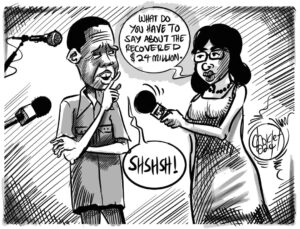CIVIL Society for Poverty Reduction (CSPR) says the continued increase in Zambia’s domestic and foreign debt will exacerbate poverty levels in the country.
In an interview, CSPR programmes coordinator Chimuka Nachibinga said the increase in foreign debt will reduce funding to social protection programmes like the Farmer Input Support Programme (FISP) and Social Cash Transfer, resulting into increased poverty levels.
Zambia’s foreign debt rose to $11.2 billion from $10.23 billion as at end of December 2019.
“The effect of the high debt is that social protection programmes are not being reinforced. So you find that even money that is supposed to be channelled towards social protection programmes, let us say for example FISP, food security pack, pensions, all that money is going towards debt servicing. It means the citizens are just left with nothing; they cannot survive and these definitely will lead to high levels of poverty in the country,” Nachibinga said.
“When you start affecting sectors like the social sector, it means that the health sector is going to be affected, education is going to be affected; it will have a cascading effect now when it comes to the citizens themselves. For example, last year, social cash transfer only was allocated about K800 million but the disbursement was only K200 million. So those poor and vulnerable people that depend on social cash transfer have been affected, they are four months in arrears. How are they surviving? So this puts a lot of stress and deteriorates the living standards of the people because if they are dependent on the social cash transfer money and they do not receive that money, then it means that they will not have meals, they will not have access to basic necessities and so on and so forth.”
He projected a further increase in the country’s debt due to the many projects government was currently undertaking.
“When you look at reserves that we have, we have lessened reserves but we have so many activities coming. We can look at the elections, they are just next year and so many other projects, infrastructure, that the government has continued to develop despite not having benefits coming in from there and even the payment of other loans that have already matured. So for me…I foresee an increase [in debt] because of the number of activities that are coming up,” Nachibinga said.
He said the the domestic debt was further affecting local businesses in the country.
“Already, from last year and to early this year, we have seen the debt going up, that means that both the external and internal debt, but then the issue comes in terms of the country having resources to pay back the debt that is being accumulated. So you find that the country is not in a position in terms of resource creation to pay back the debt that has accumulated. Already, we know that the country is owing even internal [creditors]; there are certain arrears owed to suppliers. This has an adverse impact that the local suppliers, the businesses that these guys do, will be affected in one way or the other because they will not be able to have other materials to supply. These people need to pay their employees and so forth and so on. We find that if these guys are unable to pay their employees, their employees will also be affected because they will not have income that they would have generated for them to survive and get other basic needs,” Nachibinga said.
“Other businesses will die a natural death and that is detrimental when it comes to economic growth because economic growth is championed by different small scale industries that are born locally and also attraction to foreign and direct investment. When you look at the external debt that the country has, we have already seen from maybe three years down the line, we have seen that allocations to other sectors of the budget have reduced and most of the money is being allocated towards debt servicing.”
He further called for practical measures that will enable government to acquire financial assistance from the International Monetary Fund (IMF).
“The investors out there look at the stability of the country. Now if the country has accumulated such huge debts and they are not in a position [to pay back], it also lowers the confidence of the investors outside the country. That means that we will experience slow economic growth. It is from the economic growth, when it is performing well, that we enjoy the trickle down effects. For now, we will have the negative aspects coming from the results of lowered economic growth such as high levels of unemployment, crime will come in because people are stressed…they don’t have what to do. There are so many negative things that come from the result of this,” said Nachibinga.
“We urge the government to find ways of how they can…revamp some of the local industries and that could be the only way we can create our own resources and also create employment by moving from the primary industries going into tertiary industries. We can do value addition in so many sectors; we can revamp some of these sectors that are not doing well like tourism. We can also welcome the IMF economic stabilization concession loans. I think that is the only way out in a short space of time because there is nowhere we can run to for us to have our economy stabilized, so IMF is the way out of thIS situation.”












